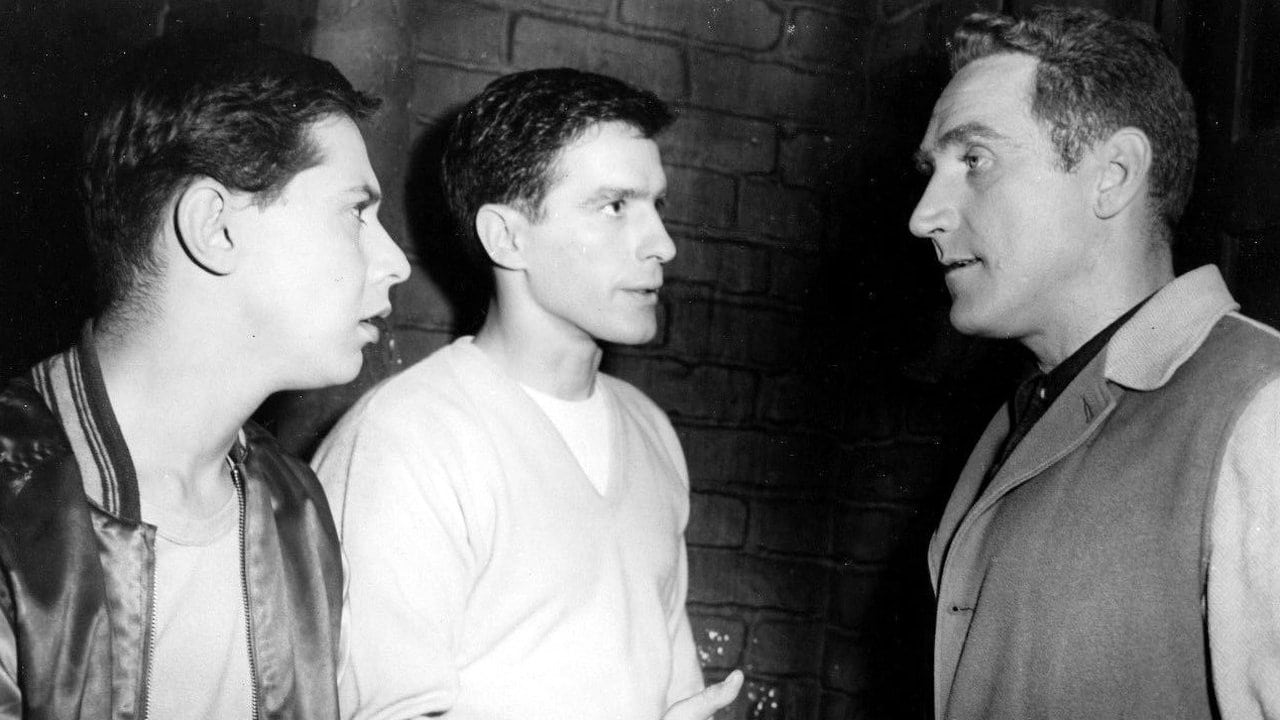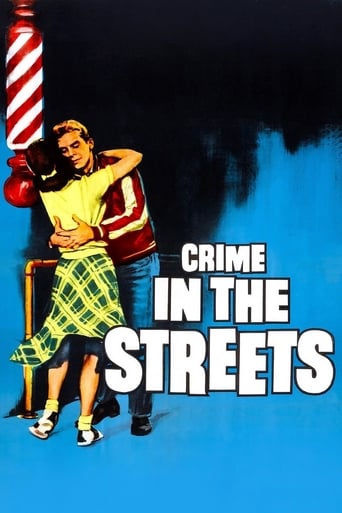

The film's masterful storytelling did its job. The message was clear. No need to overdo.
... View MoreThere are moments that feel comical, some horrific, and some downright inspiring but the tonal shifts hardly matter as the end results come to a film that's perfect for this time.
... View MoreIf you're interested in the topic at hand, you should just watch it and judge yourself because the reviews have gone very biased by people that didn't even watch it and just hate (or love) the creator. I liked it, it was well written, narrated, and directed and it was about a topic that interests me.
... View MoreThrough painfully honest and emotional moments, the movie becomes irresistibly relatable
... View MoreAll aboard for cheesy sets and a lot of unconvincing talk, talk, talk with the usual stock characters and stock situations.James Whitmore, badly miscast, is a dead weight. Cassavetes is all sub-Brando method acting, but Sal Mineo is bit more with-it than usual.Nonetheless, the only really impressive performance is offered by Mark Rydell. On the negative side, production values are extremely crummy. Don Siegel, Sam Leavit, amd Franz Waxman should hang their heads in shame for respectively contributing such uninspired direction, plodding photography, and a pedestrian music score.And as for art director Serge Kriznan, he should be drummed out of town. Or maybe the shabby sets were entirely the fault of penny-pinching producer Vincent M. Fennelly?
... View MoreThe film reminds me of one of those powerhouse Studio One TV plays of the early '50's. And that's a key problem. The movie comes across as a filmed stage play as though the format hasn't changed at all. I expect TV playwrite Reginald Rose had a lot to do with that approach, while ace action director Don Siegel simply followed out the script in uninvolved fashion. In short, the screenplay is way too talky, under-produced, and poorly staged. Never once, for example, did I forget that the street scene was mounted on a sound stage, with all kinds of traffic noises at the same time cars seldom pass on the roadway. Also, the few sets are so unrelentingly dreary and without a shred of adornment, you might think the deficiency is in the people rather than the conditions. After all, a shred or two would be more realistic, even in a slum. So, why rub our nose in it.Then too, the screenplay repeats about every delinquency cliché of the day—alienation, no father, poverty, to cite a few. Now, there is some truth in these clichés, as there is in most clichés. The trouble is the script simply parades them in unoriginal fashion leaving the impression of having seen it all before. Worse, that intense actor John Cassavetes is given little to do but brood and posture and look 27 instead of the supposed 18. And what's with dressing him in a yuppie v-neck sweater that looks like it belongs on a Harvard freshman.Nonetheless, it is an accomplished cast with some colorful characterizations. Mineo's excellent as the reluctant delinquent, Gregg fairly oozes bread-winner exhaustion, and little Votrian can look pathetic on cue. At the same time, Rydell's sadistic grin suggests needed malevolence, while Whitmore's social worker is happily no miracle man. Clearly, this is an earnest effort whose heart is in the right place. Still and all, the positives are too few to outweigh the stagy negatives. In short, there're good reasons this obscurity is not included among the delinquency classics of the day.
... View MoreCRIME IN THE STREETS is so obviously a message picture that's it's almost painfully didactic in spots, a less-than-classic "Juvenile Delinquent" opus. The worst element is the social worker (James Whitmore_ who tries so desperately to change a clearly deeply disturbed, would-be psychopath Frankie (Cassavetes) with useless talk. It's that talk that nearly kills the movie. Very little happens for long stretches while characters discuss and argue at length. To his credit, Whitmore pulls off his thankless role as well as anyone probably could. Cassavetes has his moments too, but his method style is often distracting and he's clearly too old for the typical 1950s "Juvenile Delinquent" part, despite his boyish looks and short stature. Mark Rydell plays a coded gay part, relayed through stereotyped sweeping gestures, cigarette in hand. He's excited by Frankie's violent talk and volatile personality. The forgotten Virginia Gregg hurls herself into the role of Frankie's downtrodden mother. Immersed in misery and hopelessness, she's inert, and blind to the cause her son's real problem. It's not hard to guess what Frankie's problem is about, many years and many psycho-social films after this film was made. As Frankie's long-suffering little brother, Peter J. Votrian never hits a false note and he successfully carries a couple the film's emotive climaxes. This really is an actor's movie, and two other actors bring to life the film's strongest emotional scene. Will Kuluva, another forgotten talent from the period, gives genuine paternal feeling to his part. But it's Sal Mineo as Kuluva's son, "Baby" who gives the film's truest and most realized performance. Mineo was a real, instinctive, highly gifted actor. In spite of similarities to some of his other roles in this period, he puts a distinctive mark on "Baby" and the viewer is not likely to forget him. If only this film had more energy, more action perhaps, and less talk, it may have had greater impact.
... View MoreFor revenge and thrills, juvenile delinquent gang leader John Cassavetes (as Frank "Frankie" Dane) plots to kill a man. Nail-biting Sal Mineo (as Angelo "Baby" Gioia) will lure the man into an alley, open-mouthed Mark Rydell (as Lou Macklin) will hold him down, and Mr. Cassavetes will slice and dice him to death. Little brother Peter Votrian (as Richie Dane) overhears Cassavetes planning the murder, and tells concerned social worker James Whitmore (as Ben Wagner). But, try as he might, Mr. Whitmore is unable to reform Cassavetes before the scheduled stabbing.The excellent script for "Crime in the Streets" was written by Reginald Rose, and had previously been seen as a live installment ABC-TV's "The Elgin Hour" (a dramatic anthology series). Television in the 1950s became fertile ground for great performances, and Whitmore's last attempt to reach Cassavetes, on the fire escape, is certainly high drama. The entire production is wonderfully acted; and, while Cassavetes is clearly far too old for the part, at least he gets a chance to repeat his role for film.Mineo gives the "Hornets" some youth appeal, and shows off his ability to react to other actors. Rydell, who became quite a successful director, is interesting. The lesser roles are fine. And, seeming to come out of left field, young Votrian is startlingly good. The specially designed outdoor set gives it a surreal quality, and director Don Siegel manages it beautifully. The plot is almost Shakespearian, and with the addition of music, you could imagine a certain "West Side Story" being born...********* Crime in the Streets (6/10/56) Don Siegel, Reginald Rose ~ John Cassavetes, James Whitmore, Sal Mineo, Peter Votrian
... View More